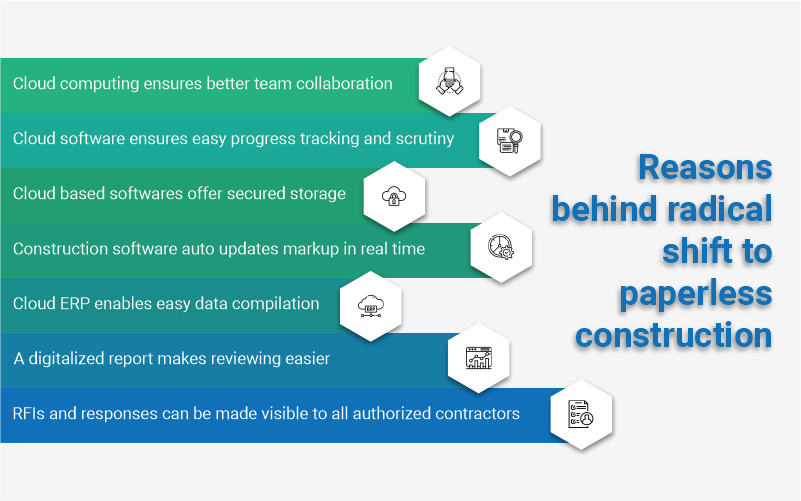Last Updated on November 23, 2023 by softtech
The construction productivity remained stagnant over the years due to outdated practices and technology. The revolutionized green business trend has brought evolution to the operational process of the construction industry. The sustainable green business module discarded the paper and blueprint workforce strategy.
Moving to paperless projects is one of the five trends shaping construction & capital projects. The radical shift to paperless construction has made the AEC industry among the fastest developing industries worldwide. Advanced cloud-based software that is constantly up to date and accessible by the right people at the right time can help construction organizations to go paperless. Moreover, when the project teams or employees use the same software, your organization becomes truly collaborative. Experts at soft tech analyzed the reason behind the shift to paperless construction.

Better team collaboration
The use of cloud-based software helps the teams to collaborate and share ideas better. All teams collaborate on the latest version or set of drawings, even onsite. Paper-based documents, forms and drawings tend to get misplaced and damaged easily. The missing documents and smudged plans can easily lead to miscommunication. The lost documents also create an obstacle in the path to project progress. The use of construction software in place of paper helps to compile and store the data and drawings in one place. The stored data can be easily shared across various platforms to different teams. The software helps to share the documents and enables the different teams to share their ideas and opinions about the projects. The paperless construction easies communication between teams both onsite and offsite.
Mark-ups are updated in real-time.
The paperless construction helps the teams and managers to mark up the reports. The mark-ups are updated in the software and can be seen anywhere. The digital mark-ups eliminate the time spent on reworking. Every team member gets their hands on the current set of documents and mark-ups. The sheet compare functionality of the software enables the teams to overlay two sheets to view changes, identify clashes and review constructability.
The software mark-ups also save time invested by construction professionals in shuffling back and forth from the job site to the trailer to review the changes. Time plays a key role in determining the success of a project in the construction domain. Research has found that on-paper documentation and mark-ups lead to time wastage, and a meta-analysis established that 50% of the time is wasted in sorting the paper dockets. The digital tools help reduce time wastage and allow the builders to focus on building plans effectively.
Easy progress tracking
Photos, videos, notes or even web links can easily be attached to mark-ups or quality signoffs. The photos and videos shared help track the real-time progress of projects. Paper progress reports and photos tend to pile up and consume storage. The process also makes it difficult to locate and access the photo reports crucial to completing the project on time; important images and notes often get misfiled or lost. In a natural disaster like fire, rain or storm, the paper documents get destroyed easily and are lost forever. Cloud-based data, photos, videos, notes are always secure. The documents stored digitally are protected and secured by SSL security. The cloud documents also have regular backups. Digitalizing the documents and project reports safeguards them against waterlogging, ripping, misplacing and burning.
The ideal construction software timestamp the received photos, videos and notes. The software files them according to the date and time stamp. The timestamp helps to analyse the work done by the employees. The digital timestamp eradicates the need to decipher handwriting to figure out the person marking the sheets. This makes it easy to recall information in case of litigation.
Easy reviewing
Checklists and reports can be filled out, reviewed and submitted quickly. The digital submission of checklists helps to track the work scheduling and logistics purchase and supply. The digital reports aid the project managers, stockholders and builders to review the project updates in real-time. The project reports also help determine the financial forecast to improve productivity. In addition, the checklist and daily operation oversight help the construction firms to prevent injuries and protect projects against liability.
Several firms use digital checklist features to improve business processes through data structuring drastically. For example, the digitalized checklists and reports help construction firms to stay organized, productive and safe.
RFIs and responses can be made visible to all authorized contractors
An RFI refers to a request for information used in construction to clear the uncertainties and fill the gaps in information. RFIs form an integral part of the construction communication process. The RFIs and recorded responses are stored in the cloud-based software. During need, the RFIs are made visible to authorized contractors through passcodes. The process helps to prevent a data breach of the contracts. Sending the RFIs in place of physical documents also helps reduce the timeframe expectancy of the response received.
The document tracking platform of the software makes tracking of RFIs and reports easier. All that a project manager needs to do is login in and track the RFIs through excel sheets. The approvals and communications over the RFI sent through mails can be recorded in the sheets for easy progress tracking. Several construction management firms nowadays allow the subcontractor to track the RFI and create a response. The responses are stored in a centralized place and can be accessed anywhere, anytime by any user.
Secured Storage
All information is stored with backups in the cloud securely. Cloud-based storage prevents data breaches. Paper documents and files get destroyed and fail to withstand the test of time. The paper dockets can be smugged due to waterlogging, get charred due to burning or get damaged due to termite attack. Storing of the documents digitally safeguards them against water, fire, wind and bug attacks.
Storing paper documents, drawings, sketches and blueprints requires storage space. Amount spend on purchasing storage space increases the project cost. The use of cloud storage reduces storage and printing costs. Going paperless eliminates unnecessary costs and creates dramatic savings.
Enable easy data compilation
Compiling all information for handover and maintenance is easier than ever with cloud-based software. The cloud software stores data and auto generates reports from the collected reports. In construction, industry evaluation plays a key role in all steps. The paperless construction helps speed up the evaluation process with data compilation and analysis. The compiled data assists in establishing future goals and project outcomes. The compiled data and reports help find the project obstacles and find solutions for them.
The construction industry lagged behind other industries due to pen and paper modules. Embracing the new paperless construction norm has boosted the productivity of the firms. Adopting the new cloud-based technology saves the construction industry time and money. Paperless technology has freed the contractors and builders from the paper dependencies that obstruct the construction process. Although going paperless might seem difficult initially, prolonged usage of it reaps several benefits. So to double the profit margins, increase ROI and boost productivity, the construction industry needs to experience the digital renaissance that holds power to change the future construction game. Join hands with thousands of firms to experience the benefits earned from paperless construction.
About Author
Olivia Jones
Technology Specialist
Olivia is a highly skilled and experienced Technology Specialist with 10+ years of hands-on expertise in the rapidly evolving field of technology. She has a proven track record of successfully implementing and managing a wide range of technological solutions, ensuring optimal performance and efficiency. Olivia possesses a deep understanding of industry trends and emerging technologies, enabling her to provide strategic guidance and drive innovation within organizations. With a strong focus on problem-solving, she consistently delivers tailored solutions that align with business objectives while maximizing productivity and cost-effectiveness.
About SoftTech Engineers
A leading IT company (www.softtech-engr.com) facilitating business and technology transformation across the AEC industry through innovative software products and solutions. Equipped with 25+ years of deep domain expertise and industry knowledge, SoftTech has helped more than 4500 clients & government organizations, with more than 25000 users in India and around the world to gain a competitive edge and lead from the front in the industry.

